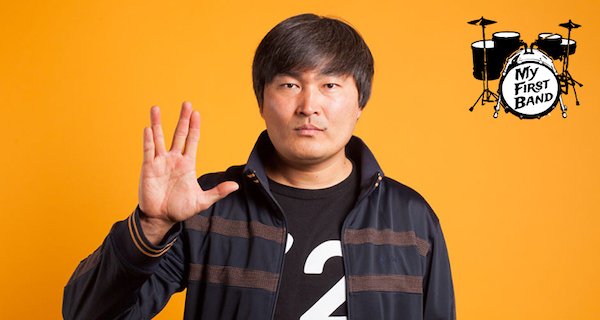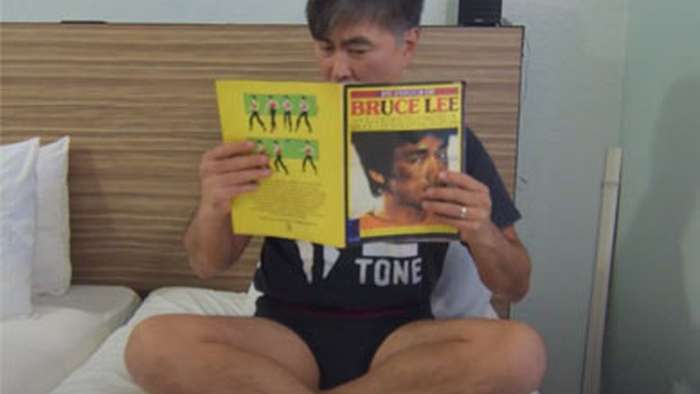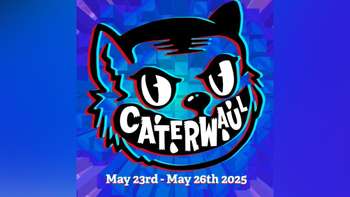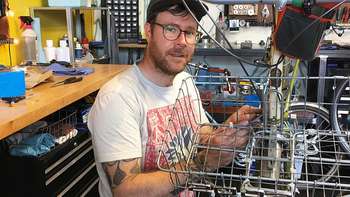“SKA SKA SKA First new Chinkees in 18 years!” To the layman, seeing those words pop up in their email inbox on an otherwise uneventful workday in late April would be confusing at best, and offensive (yet still very confusing) at worst. However, anyone like myself who is deeply familiar with the history of Asian Man Records and the label’s owner Mike Park knows the significance of such a headline.
The Chinkees are an often overlooked yet impactful and important ska-punk band that Park started in the late ‘90s. If you’re not familiar with the Asian-American supergroup, then I implore you to read a fantastic 2017 article by Vice contributor Christine Ro entitled "A Look Back at the Chinkees, the Ska Band that Reclaimed Asian Identity.” As summed by the band themselves:
The Chinkees name is not meant to be a racial slur, but just the opposite. It's meant to be a direct look at racism and the reality of its presence.
The band’s new EP, K.A. Music (which stands for “Korean American Music”), was released in early June through Asian Man Records. Around that time, Mike was gracious enough to chat with me about the new record, his musical history, his personal experiences with racism (in and out of the punk scene), writing for other bands, and his very first Asian-American supergroup that predated the Chinkees.
Scene Point Blank: I feel like the Chinkees have always been under-talked about for how important you were, even if it wasn’t on a far-reaching commercial scale.
Mike Park: It’d be hard with that name. No matter how much money was poured into the band, I don’t think a name like the Chinkees has any chance in any commercial sense.
Scene Point Blank: Were you ever worried that people wouldn’t get it?
Mike Park: Oh yeah, of course. Early on -- probably in the late ‘90s -- I made a batch of shirts, and then I was like, “What am I doing? If an Asian person is not wearing this shirt, this is not going to go well.” I’ll never make shirts again unless I come up with a clever way to present the name that’s also educational. But yeah, especially in the beginning, the name got backlash [from some Asian Americans]. I got a handful of letters (this is still when people wrote letters). I don’t know if it was straight-up anger, or maybe more about the controversy behind the name. It never really got out of hand in terms of any person or groups trying to boycott it, but I know there was some concern. And it still feels like [there should be] some concern. If you hear it out of context, it doesn’t make any sense unless it’s explained.
Scene Point Blank: The preorder for K.A. American sold out.
Mike Park: It sold out in 24 hours the first full day. It sold more than the Bruce Lee Band did, which I was really surprised at -- and it’s only four songs, so it’s even more confusing. But, at the same time, it’s exciting. I mean the Chinkees haven’t done anything musically for 18 years so the band is kind of like an afterthought. [Guitarist] Steve Choi was like, “How do you think [the record] is going to do?” I’m like “I don’t know, I’m just going to press 500 because I don’t want to be stuck with a bunch of records.”
Scene Point Blank: What got the ball rolling with this? The reunion kind of came out of left field.
Mike Park: Steve, who was in the Chinkees (who is better known for being in the RX Bandits) had contacted me last year and said, “Hey, I’ve been working on these ska songs. I was hoping we could start a project.” We weren't even thinking of the Chinkees, and then he’s like, “You know, you could write words for it,” and I said, “Yeah, let’s do it.” And then we recorded it and I’m all “this just sounds like The Chinkees, we should release it as The Chinkees” [Laughs.] I thought it just made more sense than using another name that wouldn’t be an active band. At the very least, the Chinkees had some history with the three full-lengths and then the one EP, so there would be some excitement -- at least I had hoped so.
Scene Point Blank: You just said it’s not going to be an active band. Does that mean that you aren’t planning on playing any shows?
Mike Park: It’s not out of the question but I’m not yearning to perform Chinkees stuff right now. I don’t foresee ourselves doing anything unless it makes sense. I don’t wanna go on tour at all, but I could see myself doing a show in San Francisco and a show in Los Angeles, maybe.
Scene Point Blank: You guys toured primarily overseas [when The Chinkees were initially active]. You wouldn't be interested in doing that now?
Mike Park: I mean if it was a really good opportunity I would entertain the idea. [Laughs.] But I’m just not so excited about leaving town as I get older. Every tour I’ve done in the last ten years has become harder and harder, unless it’s to Japan. It’s more of a vacation when I go to Japan.
Scene Point Blank: Is the lineup the same as it was before?
Mike Park: No, Steve is playing organ and guitar, Kevin Hagucci’s playing drums -- this is his first album playing drums on -- and Roger Camero is playing bass, and this is his first time playing [with The Chinkees]. Me and Steve are the only ones who have been on other records. Kevin is also in the Jeff Rosenstock band and in the Bruce Lee Band, and Roger is/was in No Motiv, that old Vagrant band. I’m not sure if they’re still active. He’s also in Peace’d Out with Steve and does a lot of producing.
Scene Point Blank: I’m assuming that you have talked with the former members about this?
Mike Park: I didn’t even ask. [Laughs.] The guitarist [Greg Alesandro] moved right down the street from Asian Man. We grew up together. He texted me when I announced it, like, “Oh, what’s going on?” I’m like “Oh yeah, we just did this project,” and he was like “oh, cool!” And then Mia lives in Brooklyn and has been liking the posts. I mean, it’s been so long, everyone’s doing their own thing. Greg is the only one who lives here. Steve is in Los Angeles or Long Beach. And I’m trying to think, like... I can’t even remember who played drums on Searching For A Brighter Future. It might have been Rob Kellenberger. I can’t remember. [Interviewer’s note: It was Steve Choi]
The first album was just a recording project, which was me and the guys from Tuesday. Dan Andriano, Rob Kellenberger, and Matt Stamps. I had just recorded as a [one-off] project, and then I thought “You know, I’d like to start a band and I have these songs recorded,” so that’s how it started. I think I did [the first album, The Chinkees Are Coming...] in ‘98 and then in ‘99 I decided, “Let’s play some shows!” And so I got a band together. Then we started touring. And then I think we did that Lawrence Arms split after that, and that’s the first time we had recorded as the touring band.
Scene Point Blank: How do you feel that the message of the band might be different in 2020 than when you wrote something like "Japanese Exchange Student" or “Pardon My Mistake?”
Mike Park: I think it’s more relevant right now than it was back then. I hate to assume, but I would bet my life on it: the majority of white people can’t tell the difference between Chinese, Japanese, and Korean people. Right now you’re looking at a lot of fear, a lot of resentment towards Asian Americans in the United States. So there could be someone who is born here and is Japanese, and they can’t even speak Japanese, but can be accosted at a grocery store or a gas station or be frowned upon. Or someone can drive by and yell some crap at them. My wife and I live in this pretty affluent little suburb of San Jose. Maybe ten years ago, we were driving just down the street. I was driving one way and a guy was driving the other way -- it was a two lane road -- and he [shouted] “go back to Asia.” And I remember like looking at my wife and we kind of laughed and then I’m all, “well, at least it was like respectful racism” [Laughs.] He didn’t say “Go back to China,” so I’ll give him props for that, [Laughs.]
That stuff happens. It doesn’t have to be physical. It’s just as jarring if someone yells something at you. It’s not fun. Especially for me, I seem like a pretty chill guy but my fuse can be lit really quick if I hear someone say something like that. I get really angry -- I’m ready to fight easily. So I’ve always been working on calming myself in any situation. I try to let those things just kind of pass by without any confrontation. In the old days, my gosh, I would have gotten road rage, chased them, and tried to fight them.
Scene Point Blank: I remember you tweeting something about flipping someone off and apologizing for it.
Mike Park: Yeah, I did! I was going to a rehearsal wedding up in the hills and I pulled over to let this guy in a big pickup truck pass me. He yelled something and I said “Okay!” I lost it, floored it, and started honking my horn. We pulled over and two guys jumped out and I just said, “Okay, I gotta either walk away or I’m going to have to try to fight them,” And then I went for the fighting. I said, “Okay, let’s go!” And then they got scared. [Laughs.] I was so thankful because, I mean, there were two of them. I don’t know what I was thinking, but I’m pretty intimidating. I think I just got in a Tai-Kwan-Do stance that I learned when I was a kid. I was like, “If they’re going to be racist, then I’m going to push their assumption to my advantage.” But good god, I was stupid. I would hopefully never do something like that again. I was pretty upset at myself for putting myself in that situation, but if I was in my early twenties, I would have fought them for sure, which is terrible. [Laughs.]
[Interviewer’s note: Mike officiates Weddings under the business name of Punk Rock Weddings.]

Photo: Milwaukee Record
Scene Point Blank: It’s funny to hear about you fighting people. One of the most publicized Mike Park stories is the [skinhead audience member] calling you slurs and you pulling him out before the crowd swarmed him.
Mike Park: Oh yeah, that was surreal. That was in Tampa, Florida, I believe. That also happened in Baton Rouge, Louisiana, for a very small crowd. There were maybe 20 people at the show, and like six skinheads. The skinheads were having fun. They were kind of dancing around and having a good time and we started playing some anti-racist song and then it turned sour. I think the club owner had a gun and just said, “Get out of the club” and they left. And we were scared, like, “Oh no!” [laughs.] I think it was a place called the Art Bar in Baton Rouge, Louisiana. I’m trying to think -- this is like 26 or 27 years ago.
Scene Point Blank: Things seem so different now.
Mike Park: Yeah, but I see this stuff happening, you know? I’d be curious to see what touring musicians in the underground [have to say about it]. There’s just not a lot of Asian Americans playing punk rock, so it’s hard to know. I don’t have a shared community to talk about this stuff with. That’s why the Chinkees were cool because we did get together every week, and then we went out and got a burrito after practice and hung out. A lot of us had grown up with just white friends. It was just normal for us to be one of a handful of Asian kids at a school. So it was kind of empowering for [The Chinkees] to be able to be a posse. [Growing up] we had no qualms with looking at ourselves as minorities. It was not a big deal in the sense that we were able to make friends and integrate with other cultures, but we were kind of white washed in a way. Even though we were Asian, we were kind of what they would call bananas -- yellow on the outside, white on the inside -- because we didn’t have a lot of Asian friends growing up. Though in high school I did an all Asian band called Y.W.C.A. - Yellows With Chink Attitude. It was just every Asian kid at our school, basically. Four of us in the same grade, and then the drummer was a sophomore. We just played a couple shows at school, the talent show, or like a dance type of thing. That was cool too. [Laughs.] Every Asian American from our class was in this band.
Scene Point Blank: I’ve never heard of this band!
Mike Park: We never recorded anything but Greg who was in that band is also in the Chinkees, even though he’s not in the current recording (I still consider [past members] as part of the band).
Scene Point Blank: You’re in a variety of bands right now. These new songs sound like a fresh direction for the Chinkees, especially since you came out swinging 20 years ago. Does working with so many younger bands [through Asian Man Records] inspire you to be innovative and creative?
Mike Park: I think indirectly it does, for sure. I like working with young bands. It keeps you humble because you get to enjoy their excitement, whereas older bands are all jaded and know-it-alls.
“It’s hard to teach an old dog new tricks.” That saying, I think, holds true in a lot of ways, especially with old punks. I always think you need to progress with the times and I just like music. And I have many outlets now. Whether it’s with Kitty Kat Fan Club or Ogikubo Station, Bruce Lee Band, The Chinkees, or my solo stuff. I’ve been writing songs for other bands too, which I’ve done in the past but am doing more now.
Scene Point Blank: Are there any that you can say the names of?
Mike Park: I’ve written a lot for Japanese bands: three songs for Kemuri, and I wrote a song for Softball. I just wrote a song for Dan Andriano, for his daughter actually. He does all the music and sings with her. I’ve written a song for a band from Germany called Skafield... I [also] wrote a song on the Link 80 EP.
Scene Point Blank: I don’t mean this to be accusatory in any way, but I feel like it’s odd to think about Link 80 having someone else write a song for them.
Mike Park: [Laughs.] I think Nick [Traina - vocalist of Link 80] just asked me to at the time? That’s pretty much it. I’ve written more for other bands, [but] I’m blanking right now. I’d have to look at my discography through my publisher... There’s a band from Japan called Bee’s Knees I wrote a song for. I was making some good money writing for Japanese bands. [Laughs]. I wrote a song for Kemuri’s singer. He released a solo album last year. It’s cool to hear someone else singing your music.
Scene Point Blank: Did you write anything on the Hey Smith album?
Mike Park: [Laughs.] No, not at all. I’ve never met those folks, I’ve only met their manager.
Scene Point Blank: They’re really good!
Mike Park: Yeah, they are. I haven’t seen them live. I’ve seen some videos, but I’ve heard from friends in Japan that the live shows are really amazing.
Scene Point Blank: I just wanted to say that like I love The Mugwumps. I think that’s one of the best pop punk discoveries I’ve ever gotten from a $20 deal. They’re a Japanese band, right?
Mike Park: [Laughs.] That’s another band I never met. A distributor we were working with from Japan had turned me on to them.
Scene Point Blank: A lot of the [Japanese] bands I hear are a cut ahead of a lot of American bands.
Mike Park: Yeah, I’m just a fan of that sound. Especially Japanese punk, it has this crazy energy. Most of the bands sing in broken English, and it has a kind this cool aesthetic, at least to my ears. It’s funny because when bands send me music, I usually don’t even listen to it. But if they’re from Japan I always listen to it, because in most cases it’s going to be good. I most likely won’t put the record out, but I’m always curious to listen.
Scene Point Blank: I feel like ska’s had a resurgence in the last couple years with things like Bad Time Records or SkaTune Network. Are there any new ska bands that you’re a fan of?
Mike Park: Catbite from Philly is the best new band I’ve heard in the last 10 years. Hands down.
Scene Point Blank: Anything else you want to say about the Chinkees record?
Mike Park: I’m just excited! It’s just cool to put out new music, and I know it’s a small demographic, but I think the fact that we were able to sell out 500 in one day is a pretty cool feat. I’m just excited to add more to our discography.
--
K.A. American is out now. Stream it below.







